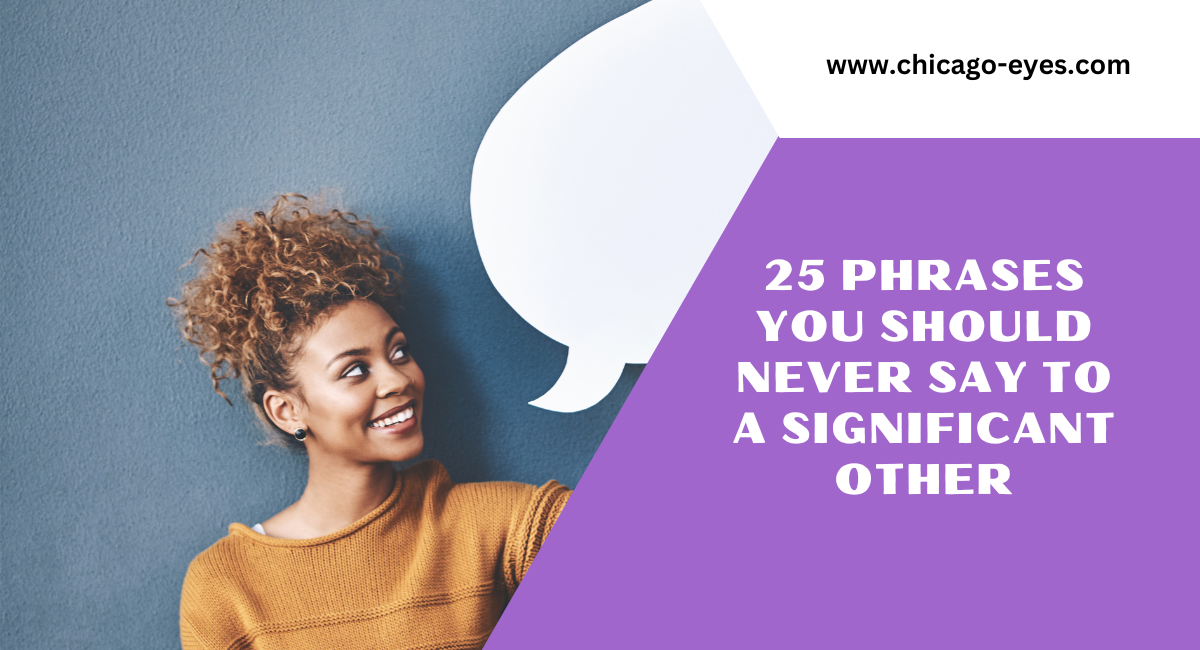Every relationship has its ups and downs. But sometimes, the words we choose can unintentionally hurt our partners and create unnecessary conflict. Here are 25 phrases to avoid for a happier, healthier relationship:
Criticism Wrapped in Compliments: Backhanded Insults that Sting
These seemingly positive statements often have a hidden jab, leaving your partner feeling confused and hurt.
“You look great… for your age.” This backhanded compliment undermines the genuine praise by adding an unnecessary age qualifier.
“Wow, you actually finished that project! I didn’t think you could.” This statement downplays your partner’s accomplishment and implies a lack of faith in their abilities.
Focus on Solutions, Not Blame: Phrases that Shift Responsibility
These phrases place blame on your partner and don’t offer solutions to move forward.
“You always…” or “You never…” These blanket statements shut down communication and make your partner feel defensive.
“If you just hadn’t…” This phrase focuses on blame rather than finding a solution to the problem at hand.
Mind Reading Mishaps: Assuming You Know What Your Partner Thinks
These statements make assumptions about your partner’s thoughts and feelings, potentially leading to misunderstandings.
“You’re just mad because…” This phrase disregards your partner’s perspective and shuts down open communication.
“You don’t really mean that, do you?” This undermines your partner’s feelings and implies they can’t be honest with you.
Minimizing Their Feelings: Dismissing What Matters to Your Partner
These phrases dismiss your partner’s emotions and make them feel unheard and unimportant.
“It’s not a big deal.” This invalidates your partner’s feelings and minimizes the importance of what’s bothering them.
“You’re just overreacting.” This disregards your partner’s perspective and makes them feel like their emotions are irrational.
Comparisons: The Thief of Joy
Comparing your partner to others can make them feel inadequate and insecure.
“Why can’t you be more like…?” This comparison pits your partner against someone else, diminishing their unique qualities.
“I wish I had a partner who…” This statement highlights what you lack in your current relationship and makes your partner feel unappreciated.
The Passive-Aggressive Trap: Saying One Thing, Meaning Another
Passive-aggressive communication creates confusion and resentment. Be direct and honest with your partner.
“Fine, whatever.” This silent treatment punishes your partner instead of having a productive conversation.
“I’m not mad…” (followed by obvious signs of anger) This mixed message creates confusion and distrust.
Phrases that Erode Trust: Breaking Down the Foundation of a Relationship
These statements damage trust and make it difficult for your partner to feel safe and secure in the relationship.
“You wouldn’t understand.” This shuts your partner out and implies they don’t care about what’s going on in your life.
“Don’t worry about it, I’ll handle it.” This can come across as dismissive and controlling, taking away your partner’s opportunity to be supportive.
Remember, communication is key in any relationship. By avoiding these phrases and focusing on open, honest, and respectful communication, you can build a stronger and more loving bond with your partner.
The Power of “I” Statements: Taking Ownership of Your Feelings
Instead of accusatory statements, use “I” statements to express your feelings in a healthy way.
“I feel hurt when…” This focuses on your emotions and allows your partner to understand your perspective.
“I would appreciate it if…” This clearly states your needs and invites your partner to find a solution that works for both of you.
Focus on Appreciation: Highlighting the Positive in Your Partner
Expressing gratitude and appreciation strengthens your bond and makes your partner feel valued.
“Thank you for…” Specific thanks shows you appreciate your partner’s efforts, big or small.
“I love that you…” Highlighting your partner’s positive qualities reinforces what you cherish about them.
Building a Relationship Takes Two: Working Together for a Stronger Bond
Remember, a relationship is a team effort. Here are some tips for fostering a healthy and supportive partnership:
Practice Active Listening: Pay attention to your partner, both verbally and nonverbally.
Validate Their Feelings: Acknowledge their emotions and let them know their feelings are valid.
Find Common Ground: Work together to find solutions that address both of your needs.
Offer Support: Be there for your partner through thick and thin. Show them you care through your actions and words.
Embrace Vulnerability: Sharing your true feelings and insecurities strengthens your connection.
Show Empathy: Try to see things from your partner’s perspective and understand their point of view.
Forgive and Move Forward: Everyone makes mistakes. Learn to forgive each other and move forward together.
Celebrate Each Other’s Victories: Be genuinely happy for your partner’s accomplishments, big or small.
Remember, strong relationships are built on mutual respect, trust, and open communication. By avoiding these harmful phrases and focusing on positive communication strategies, you can create a loving and supportive partnership that thrives.
The Final Word: Building a Relationship Language of Love
Every couple develops their own unique communication style. The key is to be mindful of the impact your words have on your partner and to strive for communication that strengthens your bond. Here are some additional tips:
Pay Attention to Body Language: Nonverbal cues can communicate a lot. Make eye contact, use gentle touch, and avoid crossed arms or dismissive gestures.
Choose the Right Time and Place: Don’t have important conversations when you’re tired, angry, or distracted. Find a quiet moment where you can both focus on each other.
Focus on Solutions, Not Blame: Approach disagreements as a team working to find a solution that works for both of you.
Be Willing to Compromise: Relationships are about give and take. Be willing to meet your partner halfway.
Seek Help if Needed: If you’re struggling to communicate effectively, consider couples therapy. A therapist can provide guidance and tools to help you build a stronger relationship.
By following these tips and avoiding the harmful phrases mentioned earlier, you can cultivate a language of love that strengthens your relationship and fosters a lifetime of happiness with your partner.pen_sparktunesharemore_vert
